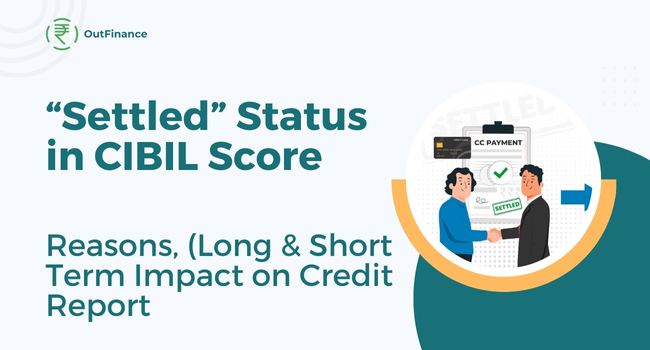(Long & Short Term) Impact of “Settled” Status on CIBIL Score

We’ll discuss the title in detail but before that I’d like to introduce the credit bureau CIBIL and CIBIL score.
CIBIL is the widely used credit bureau and most of the banks or institutions in India use their score to judge the applicant’s creditworthiness.
What is a CIBIL Score?
CIBIL score is like a report card that shows how good you are at managing borrowed money. When you take a loan or use a credit card, the bank checks if you repay the money on time.
Based on how well you handle this, they give you a score called the CIBIL score. The score ranges from 300 to 900, and a higher score means you’re good at repaying loans.
To give you the context, here is the idea about the quality of score for institutions and banks:
- 300 to 549: Very low score, shows you’ve had trouble paying back loans.
- 550 to 649: Low score, still risky for lenders.
- 650 to 749: Good score, most banks will consider giving you loans.
- 750 to 900: Excellent score, banks are happy to give you loans.
Here is the detailed guide for you on “How you can maintain the healthy CIBIL score?“
What is a ‘Settled’ Status?
Before getting to know the impact of “settled” status on your CIBIL score, let’s discuss what it is?
Let’s say you owe money to the bank, but for some reason, you’re unable to repay the full amount. You negotiate with the bank, and they agree to take a part of the money you owe instead of the full amount. When this happens, your account is marked as ‘settled’.
For example, if you owe the bank ₹10,000 but you only pay back ₹7,000, the bank may accept this and call your account ‘settled.’ This means you didn’t pay the full amount, but the bank closed the deal with you.
Different Loan Statuses & It’s Meaning
When you take a loan or use a credit card, the bank tracks how you repay the money. Here’s what different loan statuses mean:
‘Closed’ Status: When you pay back the full amount of your loan or credit card bill, your account is marked as ‘closed.’
This is good for your score because it shows you fully repaid what you owed.
‘Written Off’ Status: If you don’t repay the money and stop making payments for a long time, the bank might give up on getting the money back and write off the loan.
This is very bad for your CIBIL score because it shows you didn’t repay at all.
‘Settled’ Status: If you can’t repay the full amount but manage to pay part of it, your account is marked as ‘settled.’
This is not as bad as a ‘written off’ status but still harms your score because you didn’t repay everything.
How is Your CIBIL Score Affected by ‘Settled’ Status?
When you settle an account, the CIBIL score gets affected. A ‘settled’ status tells future lenders (like banks or credit card companies) that you couldn’t repay the full amount, which makes them see you as a risky borrower.
How Much Does It Affect Your Score?
Immediate Impact: When your account is marked as ‘settled,’ your CIBIL score can drop by a significant number of points.
This is because settling an account shows the bank that you didn’t fulfill the original agreement to repay the full loan.
Long-Term Impact: The ‘settled’ status stays on your CIBIL report for up to 7 years.
Even if you apply for a new loan or credit card years later, banks will see that you once settled a loan, and they may hesitate to give you credit.
Example:
Suppose you had a CIBIL score of 750 before settling a loan. After settling the loan, your score might drop to 600 or even lower. This means banks will trust you less when you try to borrow money in the future.
Why ‘Settled’ Status is Not as Good as ‘Closed’
Closed (Paid in Full): When you repay your loan or credit card balance in full, your account is marked as ‘closed.’ This is a good thing because it shows banks that you’re responsible and reliable.
Settled (Partial Payment): When you repay only part of what you owe, the account is marked as ‘settled.’ This shows lenders that you had trouble repaying, which makes them think twice before giving you more credit.
How Lenders(Banks/NBFCs) View ‘Settled’ Accounts
Lenders, like banks or credit card companies, view a ‘settled’ account as a warning sign. It shows them that you might not be able to repay future loans in full, and they might:
Reject your loan or credit card application.
Charge you higher interest rates because they think you’re a risky borrower.
Now, when you know the impact of the different status on your credit bureau report like CIBIL score, the major questions come, how to improve the creditworthiness again.
Can You Improve Your CIBIL Score After Settling a Loan?
Yes, You Can Recover!
You got the answer, right? Now let dive deep into further detail.
If your account has been marked as ‘settled,’ don’t worry—you can rebuild your CIBIL score. It takes time and effort, but it’s definitely possible.
How Improve Your CIBIL Score After a Settlement:
Pay Bills on Time: First thing first. From now on, make sure you never miss a loan or credit card payment. This is the most important step to rebuilding your CIBIL score.
Use Credit Wisely: Keep your credit card usage below 30% of your total credit limit. For example, if you have 3 credit cards and combined limit is ₹10,000, try to spend less than ₹3,000. This shows banks that you’re not dependent on borrowing too much.
Avoid Taking New Loans: After settling a loan, it’s best to avoid applying for new loans or credit cards immediately.
Each time you apply, your score might drop a little, and there is ~3% chance that you’ll get the loan in first place.
Check Your CIBIL Report Regularly: Keep an eye on your CIBIL report to track your score and see if it’s improving.
If there are any errors, you can report them to CIBIL to get them fixed.
How Long Will It Take To Recover From “Settled” Status Impact?
Rebuilding your CIBIL score after settling a loan can take anywhere from a few months to a few years, depending on how consistently you follow good financial habits.
As discussed already, 100% recovery can only be happen after 7 years.
Alternative Options to Settling a Loan
Restructuring the Loan
Instead of settling, you can ask your bank to restructure the loan. This means the bank will adjust the repayment terms to make it easier for you to repay in full. For example, they might extend the repayment period or lower the monthly installments.
Impact on CIBIL Score: This is less harmful than settling because you’re agreeing to repay the full loan, just with new terms.
Taking a Personal Loan to Repay
You can also take a personal loan to repay the full amount you owe on another loan or credit card. This way, you close the loan fully and avoid a ‘settled’ status.
Impact on CIBIL Score: Positive, because it shows that you repaid the full amount and didn’t settle for a partial payment.
Common Misconceptions About ‘Settled’ Status
Let’s clear up some common misunderstandings about settling loans:
Myth 1: Settling a Loan Solves All Your Problems
Reality: While settling might stop calls from creditors, it doesn’t fully solve your financial problems. The ‘settled’ status stays on your CIBIL report and hurts your score.
Myth 2: Settled Status Disappears Quickly
Reality: A ‘settled’ status can stay on your credit report for up to 7 years, and it continues to affect your ability to get new loans or credit during that time.
Myth 3: Settlement Improves Your Credit
Reality: Settling a loan actually lowers your CIBIL score because you didn’t repay the full amount.
When Should You Settle a Loan?
My only answer will be, “When you have to, only then.”
In Case of Severe Financial Difficulty
If you’ve lost your job, faced a major medical emergency, or have other serious financial problems, settling a loan might be your only option. However, it’s important to understand the long-term impact on your credit score.
If You’ve Tried All Other Options
Before settling a loan, it’s a good idea to explore other options, like restructuring the loan or borrowing from family or friends to repay it in full. Settling should be a last resort.
Talk to a Financial Advisor
If you’re thinking about settling a loan, speak with a financial advisor who can guide you through your options and help you make the best decision for your situation.
Conclusion
In summary, the ‘settled’ status on a loan or credit card account means you’ve repaid part of the money but not the full amount. While it helps in closing the account, it negatively affects your CIBIL score and stays on your report for several years. This makes it harder to get loans or credit cards in the future.
The best way to maintain a healthy CIBIL score is to repay your loans in full and on time. However, if you’ve already settled an account, don’t worry—you can rebuild your score by paying future bills on time, using credit wisely, and avoiding new loans for a while.
Remember, responsible financial behavior is the key to improving your CIBIL score and keeping your credit history clean.

0 Comments